-
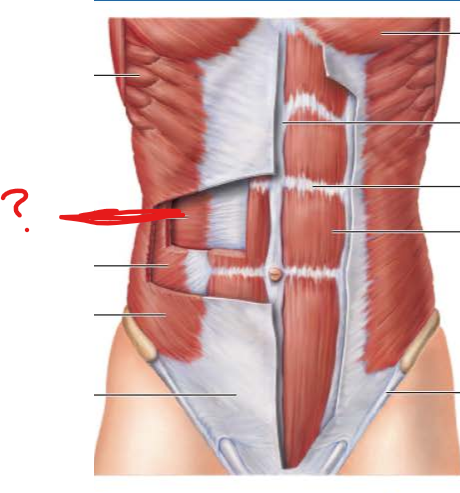
Origin:
-lumbar fascia
-inguinal ligament
-cartilages of last six ribs
-iliac crest
Insertion:
-linea alba
-pubic crest
Action:
compresses abdominal contents
-
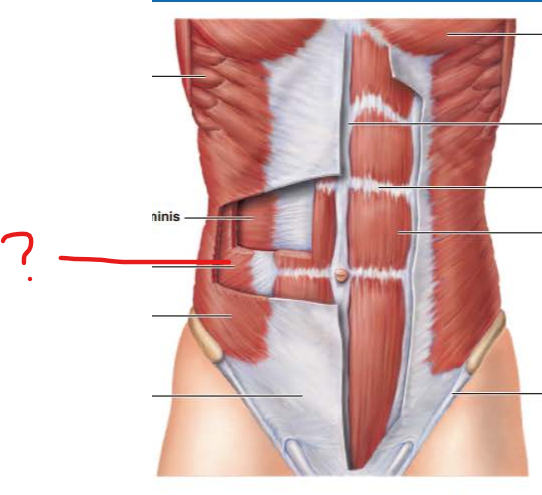
Origin:
-lumbar fascia
-inguinal ligament
-iliac crest
Insertion :
-pubic crest
-costal margin
-linea alba
-last three or four ribs
Action:
-Flex vertebral column and compress abdominal wall when pair contracts simultaneously
-individually, aid muscles of back in trunk rotation and lateral flexion
-used in oblique curls
-
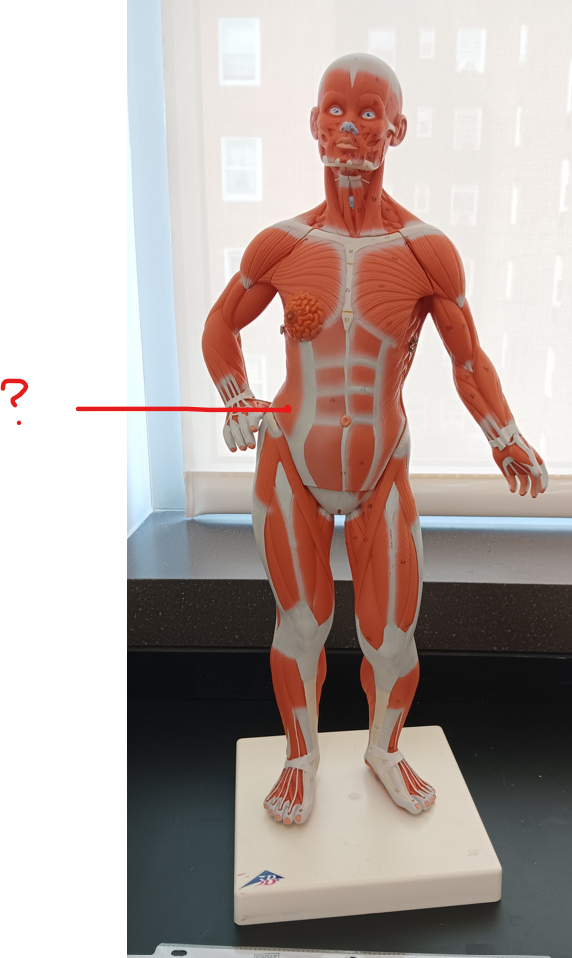
Origin:
-fleshy strips from outer surfaces of lower eight ribs
Insertion:
-most fibers insert into linea alba via a broad aponeurosis
-some insert into pubic crest and tubercle and iliac crest
Action:
-Flex vertebral column and compress abdominal wall when pair contracts simultaneously
-individually, aid muscles of back in trunk rotation and lateral flexion
-used in oblique curls
-
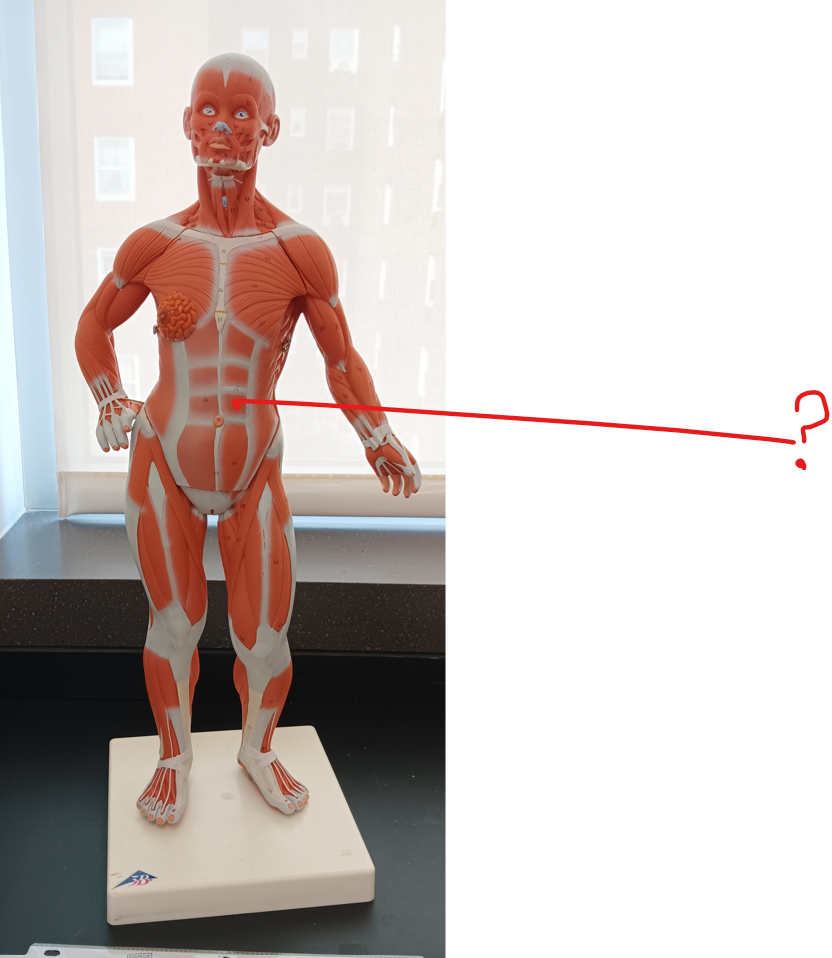
Origin:
-pubic crest
-pubic symphysis
Insertion:
-xiphoid process
-costal cartilages of ribs 5-7
Action:
-Flex and rotate lumbar region of vertebral column
-
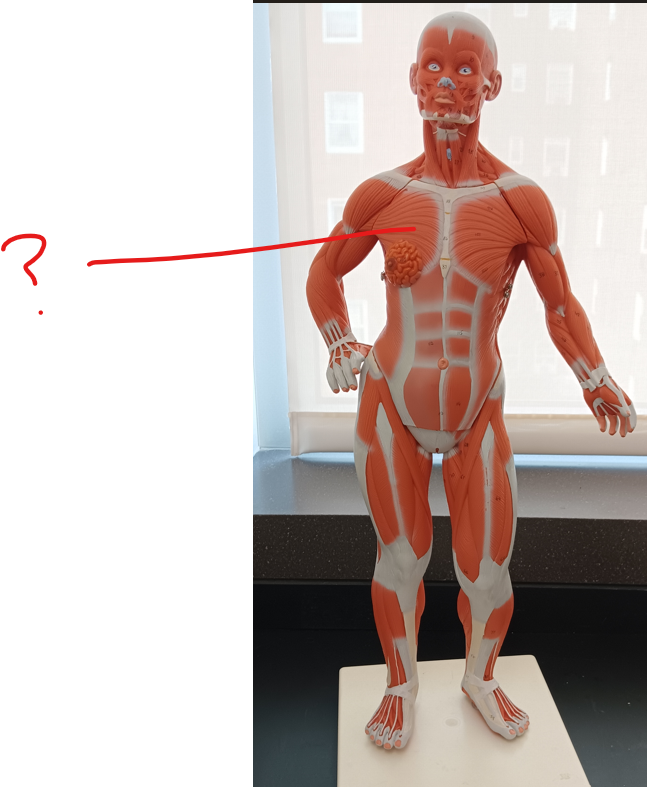
Origin:
-cartilage of ribs 1-6 (or 7)
-aponeurosis of external oblique muscle
-sternal end of clavicle
-sternum
Insertion:
-fibers converge into a short tendon that inserts into the intertubercular sulcus of humerus
-greater tubercle of humerus
Action:
-Adducts and medially rotates arm against resistance
-
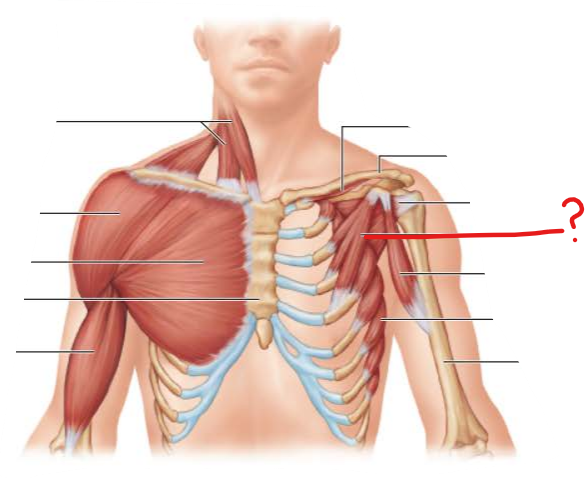
Origin:
anterior surfaces of ribs 3-5
Insertion:
coracoid process of scapula
Action:
-With ribs fixed, pulls scapula forward and downward
-With scapula fixed, pulls ribcage superiorly
-
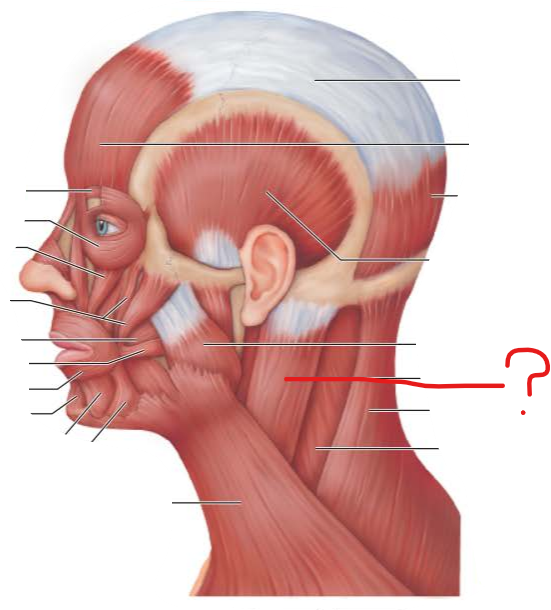
Origin:
-manubrium of sternum
-medial portion of clavicle
Insertion:
-mastoid process of temporal bone
-superior nuchal line of occipital bone
Action:
Flexes and laterally rotates the head;
-
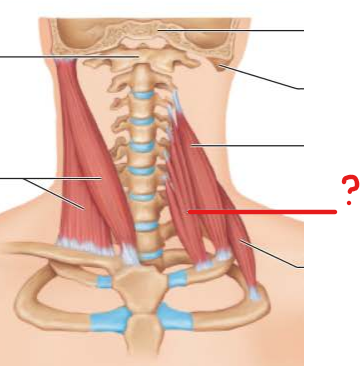
these all have the same origin, insertion, and action
origin: transverse processes of cervical vertebrae
insertion: anterolaterally on ribs 1-2
action: elevate ribs 1-2
-
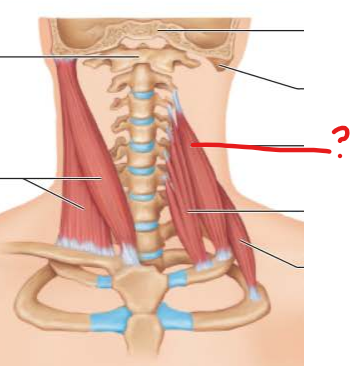
these all have the same origin, insertion, and action
origin: transverse processes of cervical vertebrae
insertion: anterolaterally on ribs 1-2
action: elevate ribs 1-2
-
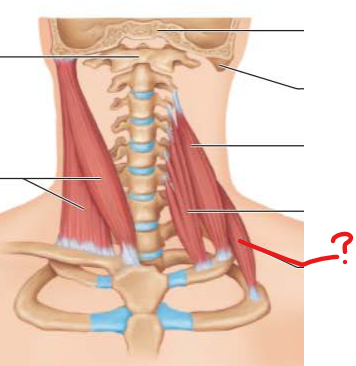
these all have the same origin, insertion, and action
origin: transverse processes of cervical vertebrae
insertion: anterolaterally on ribs 1-2
action: elevate ribs 1-2
-
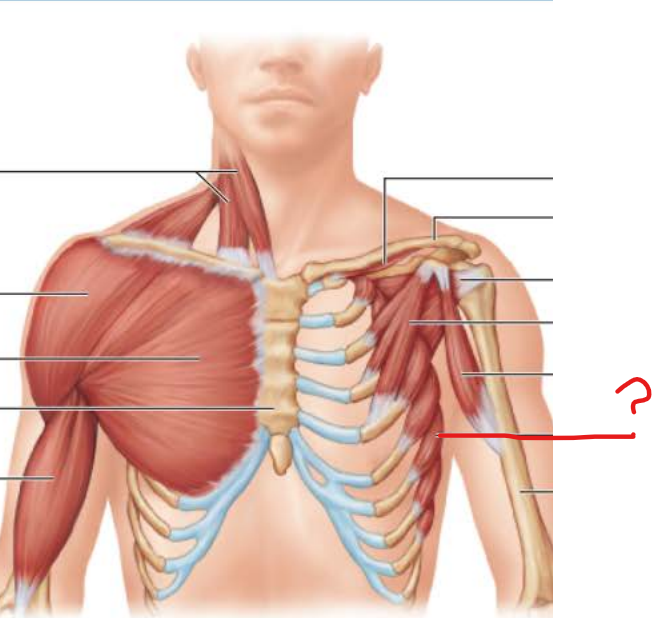
Origin: series of muscle branches from first 8 ribs
Insertion: entire anterior surface of medial border of scapula
Action: rotates scapula so its inferior angle moves laterally and upwards
-
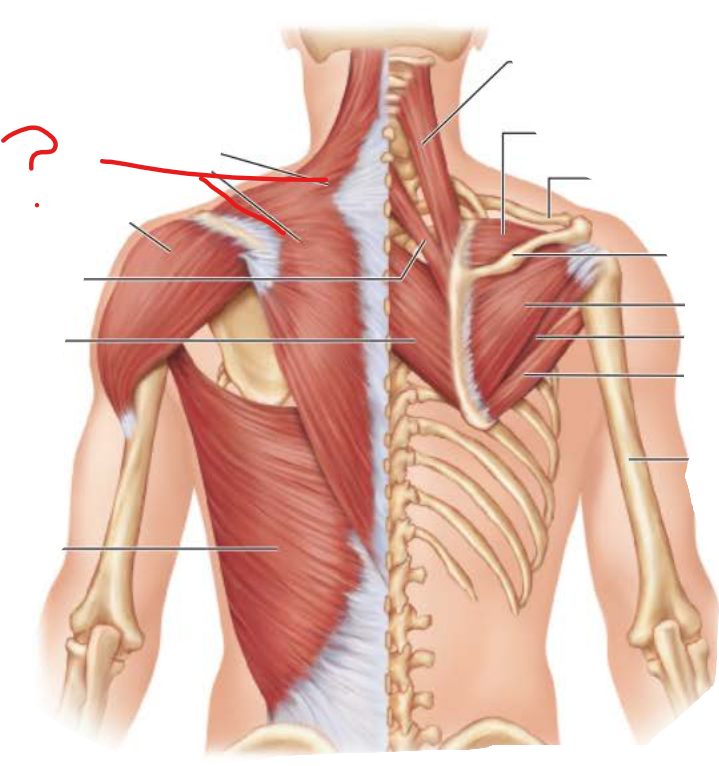
origin:
spinous processes of C7 and all thoracic vertebrae
occipital bone
ligamentum nuchae
insertion:
lateral third of clavicle
acromion of scapula
spine of scapula
action: stabilizes, elevates, retracts, and rotates scapula
-
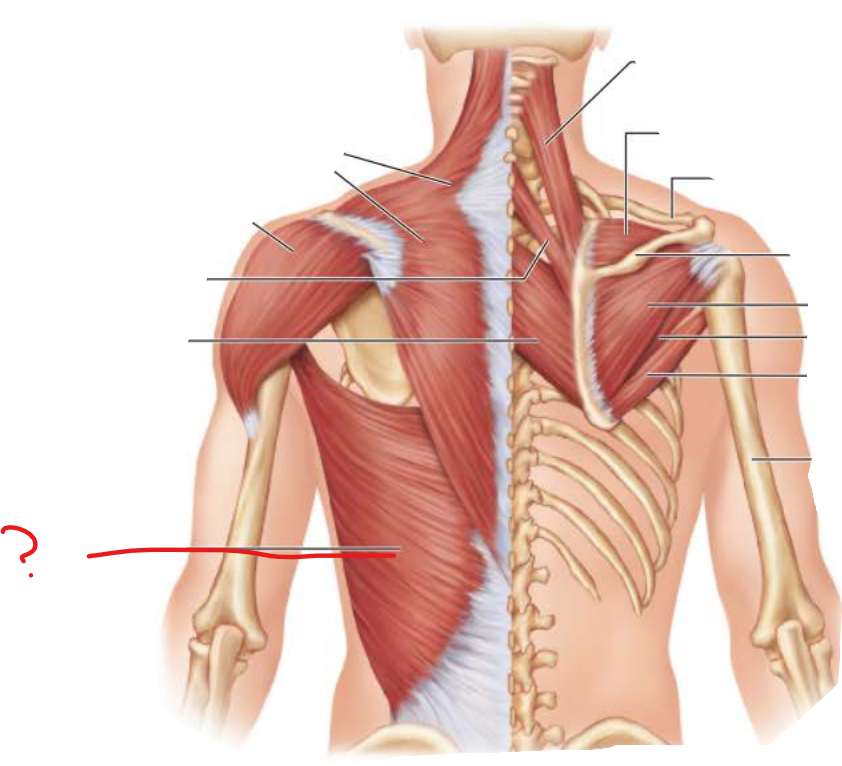
origin:
indirect attachment via lumbodorsal fascia into spines of last 6 thoracic vertebrae
last 3 or 4 ribs
iliac crest
insertion: spirals around teres major to insert in floor of tubercular sulcus of humerus
action: prime mover of arm extension, powerful arm adductor, medially rotates arm
-
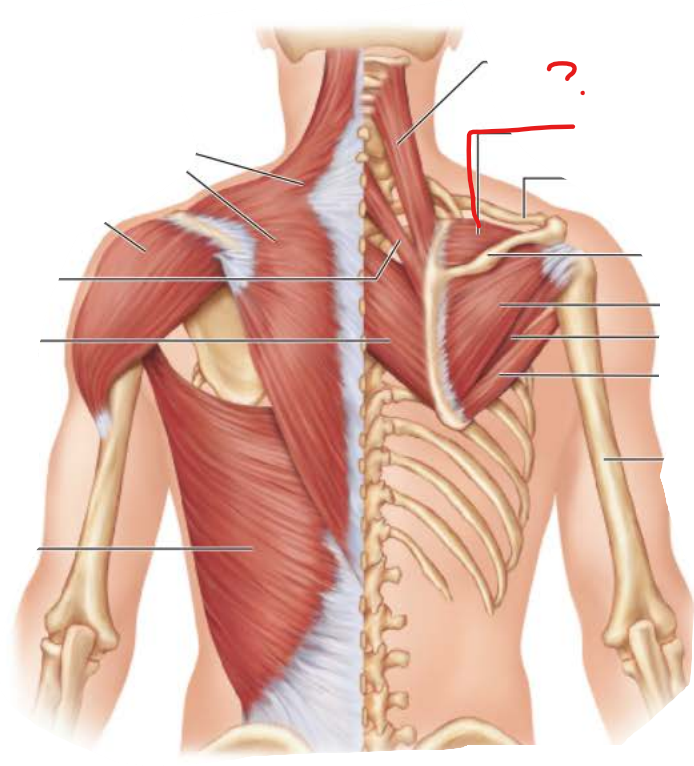
origin:
supraspinous fossa of scapula
Insertion:
superior part of greater tubercle of humerus
action:
initiates abduction of arm
-
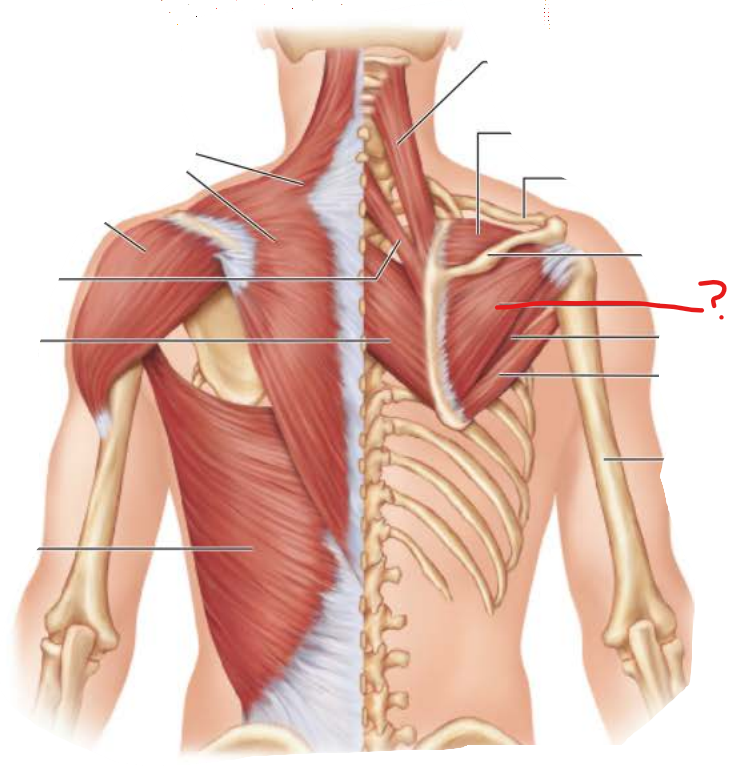
origin: infraspinous fossa of scapula
insertion: greater tubercle of humerus posterior to insertion of supraspinatus
action: rotates arm laterally
-
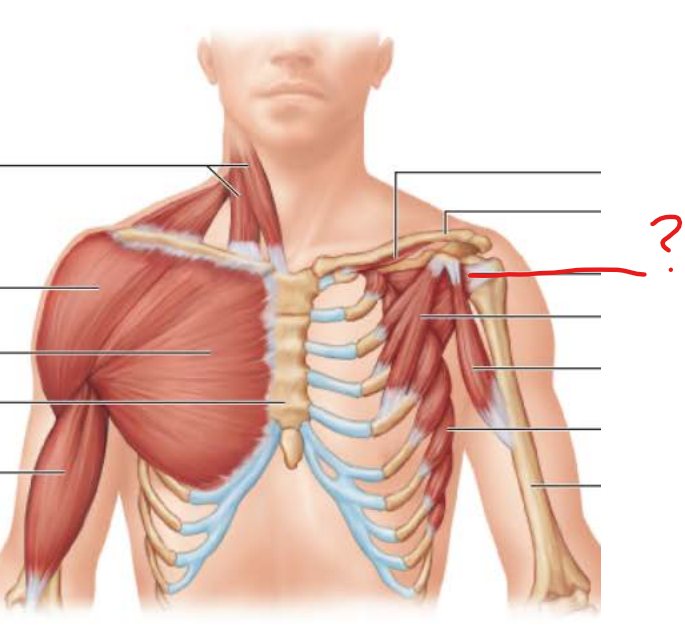
origin: subscapular fossa of scapula
insertion: lesser tubercle of humerus
action: rotates arm medially
-
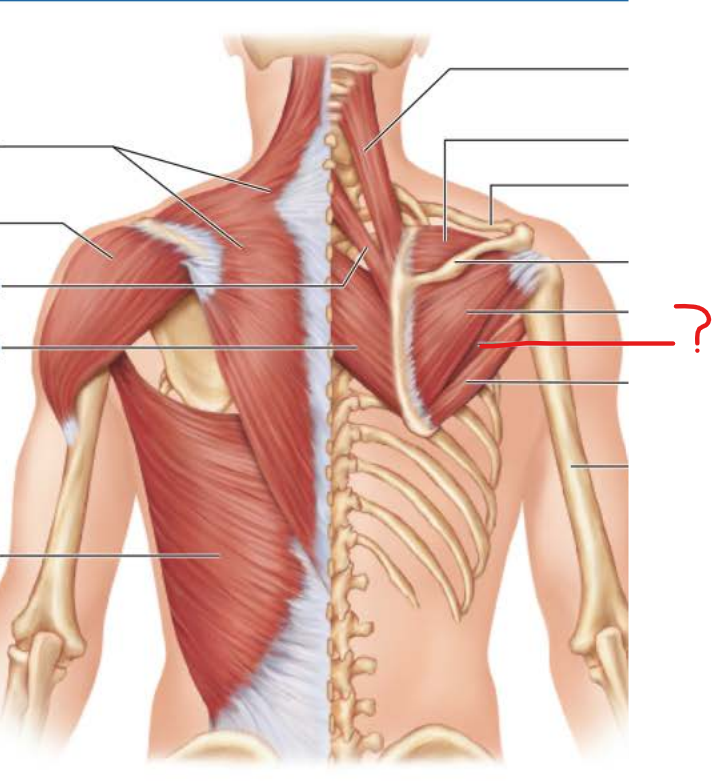
origin: lateral border of dorsal scapular surface
insertion: greater tubercle of humerus inferior to infraspinatous insertion
action: rotates arm laterally
-
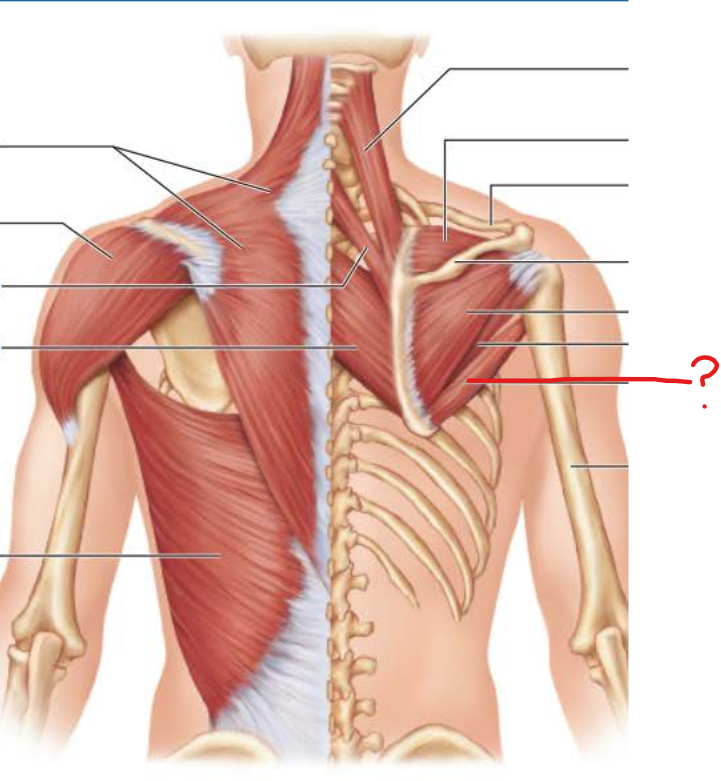
origin: posterior surface of scapula at inferior angle
insertion:
-crest of lesser tubercle on anterior humerus
-insertion tendon fused with that of latissimus dorsi
action:
extends, medially rotates, and adducts arms
-
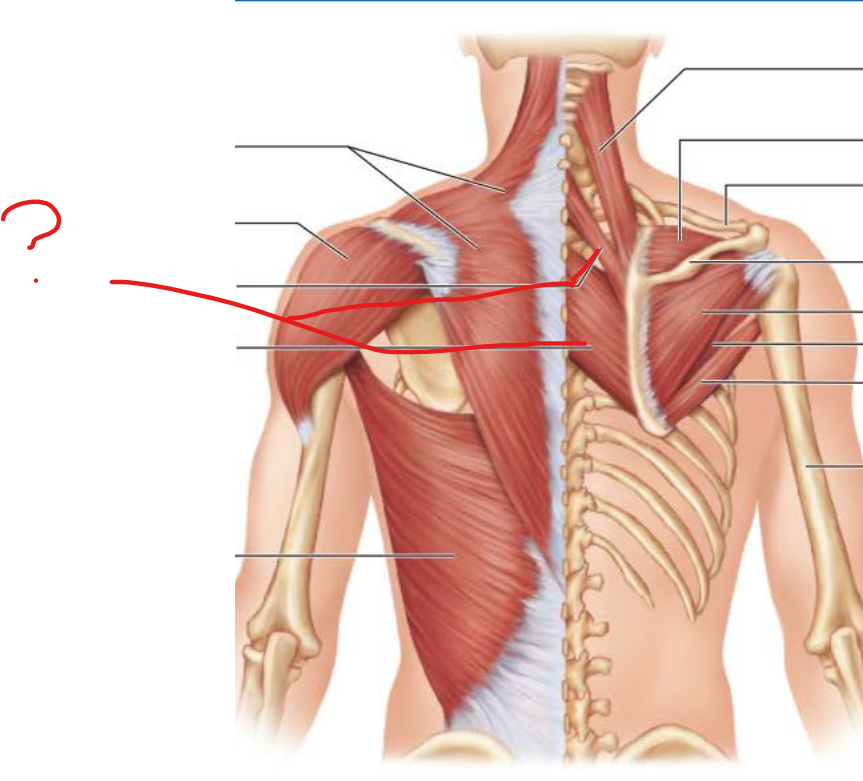
origin: spinous processes of C7 and T1
spinous processes of T2-T5
Insertion: medial border of scapula
Action: stabilize scapula
-
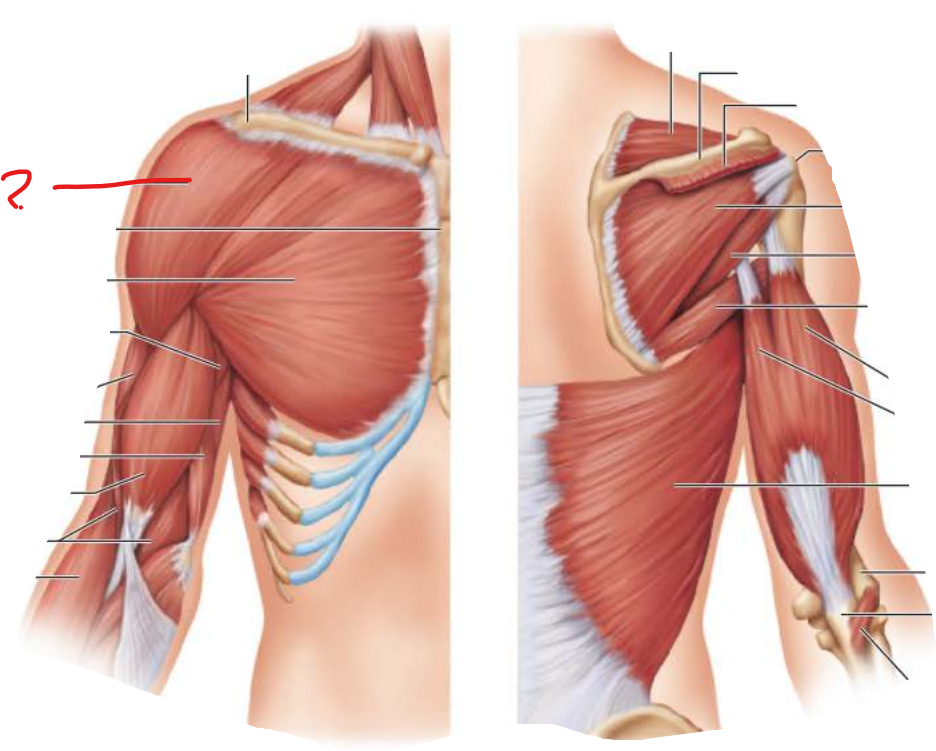
Origin:
lateral third of clavicle
acromion and spine of scapula
insertion: deltoid tuberosity of humerus
action: primer mover of arm abduction when all its fibers contract simultaneously
-
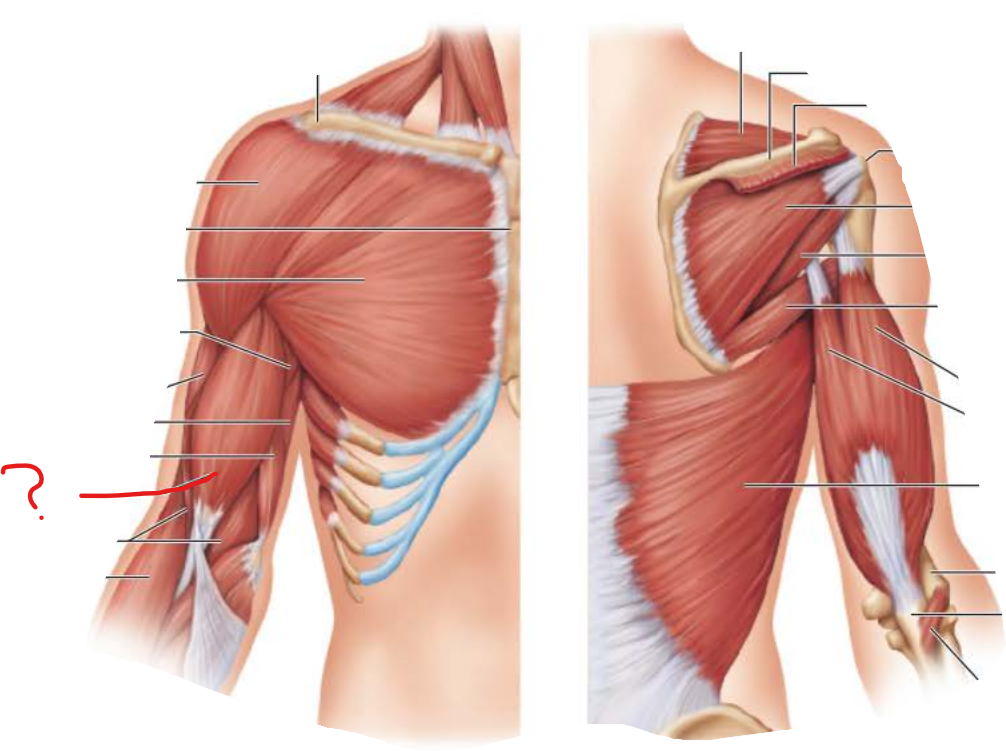
Origin:
short head; coracoid process
long head; supraglenoid tubercle and lip of glenoid cavity
tendon of long head into intertubercular sulcus
Insertion: by tendon into radial tuberosity
action: flexes and supinates forearm
-
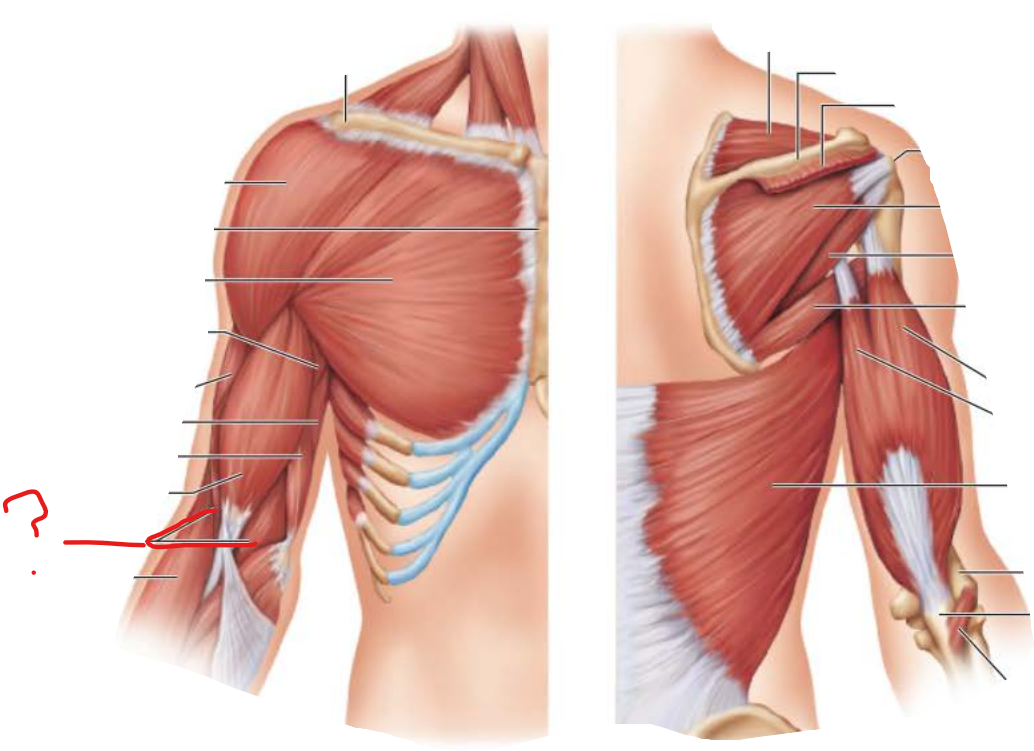
Origin: anterior surface of distal humerus
Insertion: coronoid process of ulna and capsule of elbow joint
action: a major forearm flexor
-
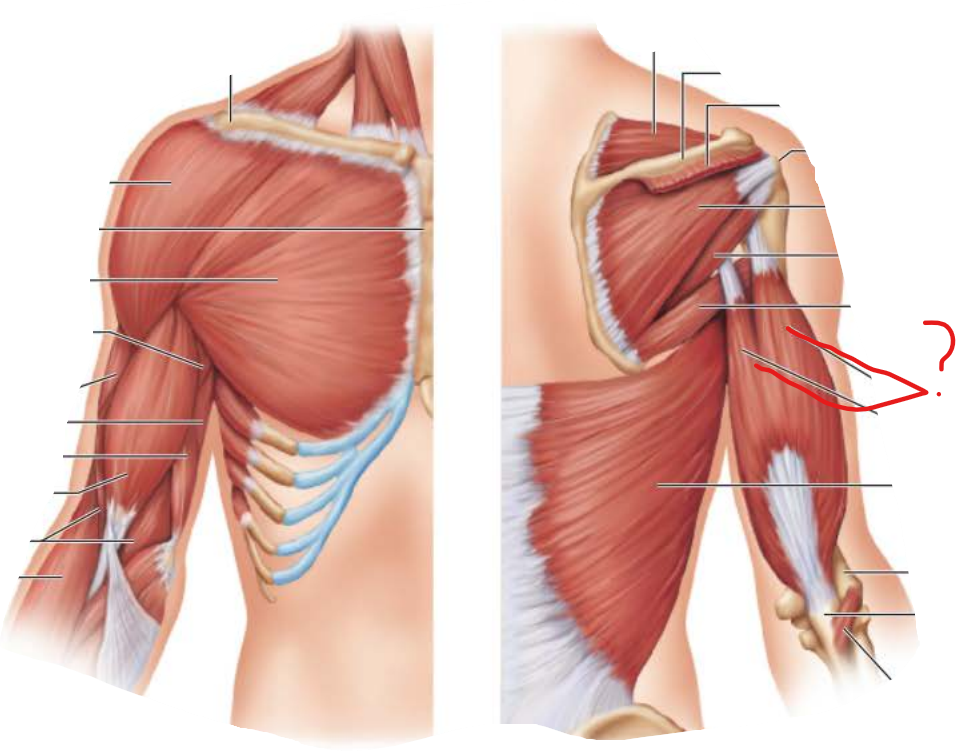
Origin:
long head; infraglenoid tubercle of scapula
lateral head: posterior shaft of humerus
medial head: posterior shaft of humerus distal to radial groove
Insertion:
common tendon into olecranon of ulna
action: powerful forearm extensor
-
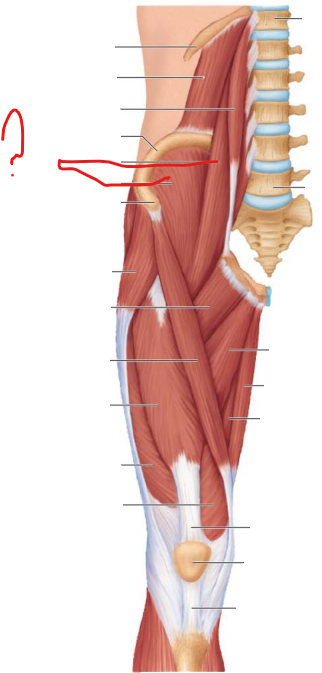
ala of sacrum
iliac fossa
iliac crest
insertion:
lesser trochanter of femur via iliopsoas tendon
action: prime mover for flexing thigh
-
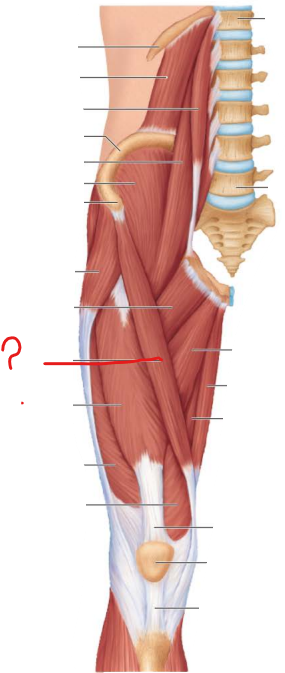
origin: anterior superior iliac spine
insertion: winds around medial aspect of knee and inserts into medial aspect of proximal tibia
action: flexes, abducts, and laterally rotates thigh
-
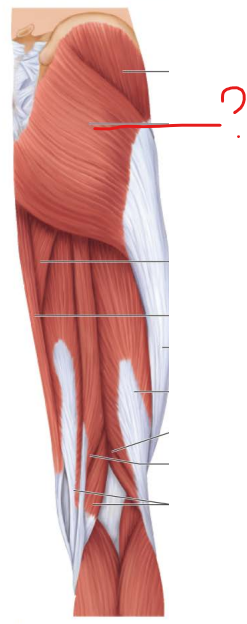
origin: dorsal ilium
coccyx
sacrum
insertion:
gluteal tuberosity of femur
iliotibial tract
action: major extensor of thigh
-
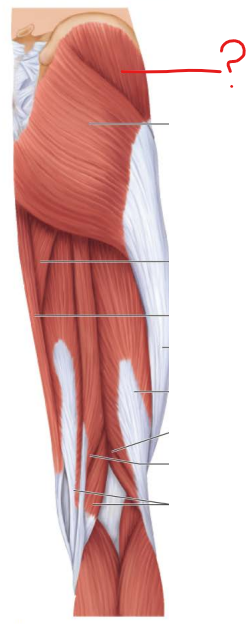
origin: between anterior and posterior gluteal lines on lateral surface of ilium
insertion: by short tendon into lateral aspect of greater trochanter of femur
action: abducts and medially rotates thigh
-
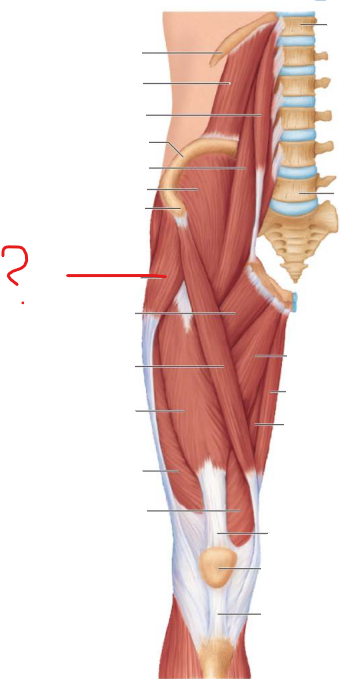
origin:
anterior aspect of iliac crest
anterior superior iliac spine
insertion: iliotibial tract
action: steadies the leg and trunk on thigh by tightening iliotibial tract
-
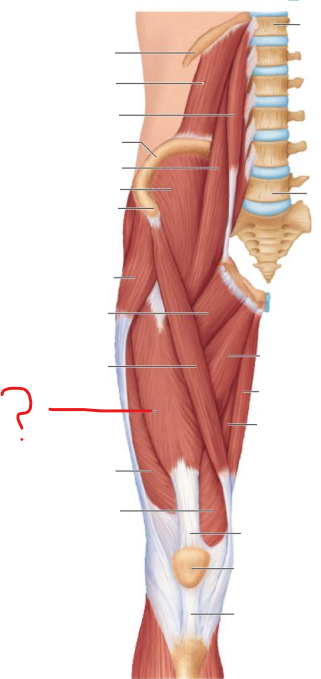
origin: anterior inferior iliac spine
superior margin of acetabulum
insertion: patella and tibial tuberosity via patellar ligament
action: extends leg and flexes thigh at hip
-
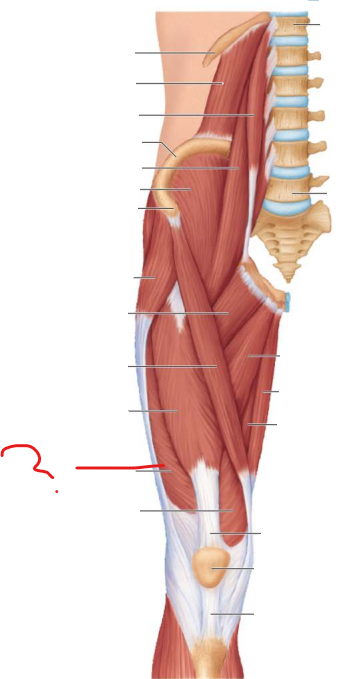
greater trochanter
intertrochanteric line
linea aspera
insertion:
patella and tibial tuberosity via patellar ligament
action: extends leg and stabilizes knee
-
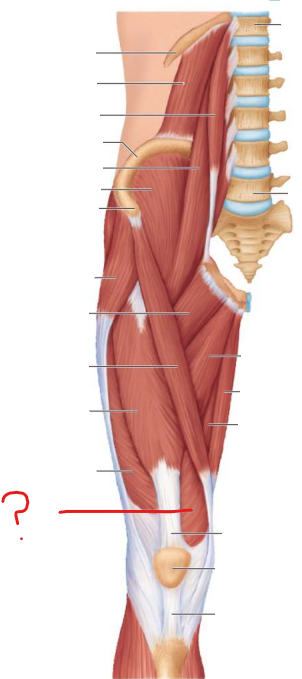
origin:
linea aspera
intertrochanteric and medial supracondylar lines
insertion:
patella and tibial tuberosity via patellar ligament
action: extends leg
-
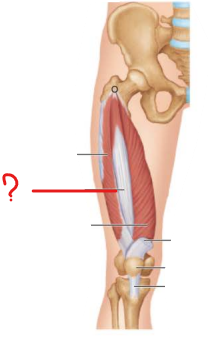
origin: anterior and lateral surfaces of proximal femur shaft
insertion: patella and tibial tuberosity via patellar ligament
action: extends leg
-
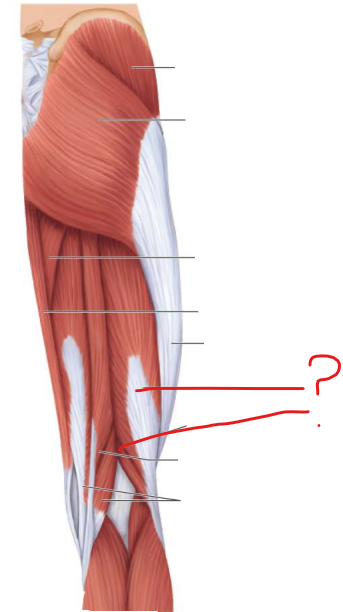
origin:
distal femur (short head)
ischial tuberosity
linea aspera
lateral supracondylar line
insertion:
common tendon into head of fibula
common tendon into lateral condyle of tibia
action: extends thigh and flexes leg
-
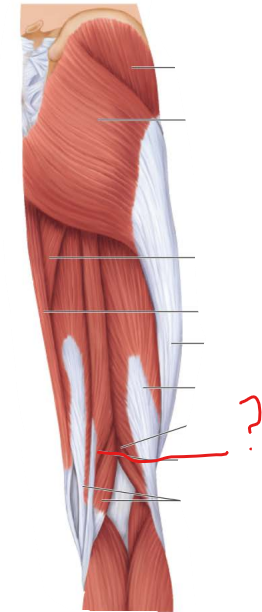
origin: ischial tuberosity in common with long head of biceps femoris
insertion: medial aspect of upper tibial shaft
action: extends thigh and flexes leg
-
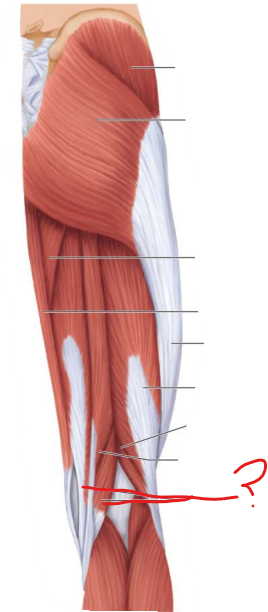
origin: ischial tuberosity
insertion: medial condyle of tibia
lateral condyle of femur
action: extends thigh and flexes leg
-
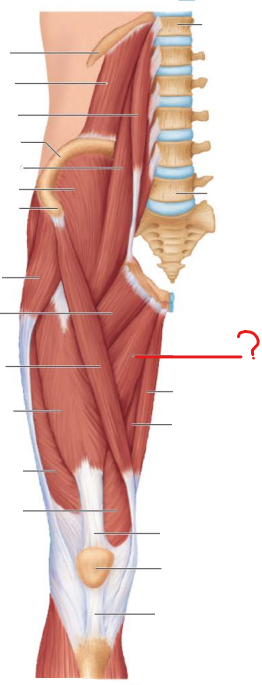
origin: pubis near pubic symphysis
insertion: linea aspera
action: adducts, flexes, and medially rotates thigh
-
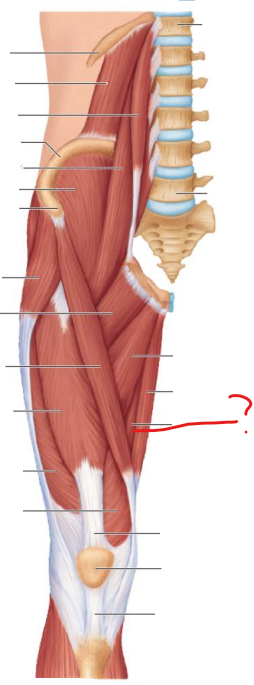
origin: ischial and pubic rami
ischial tuberosity
insertion:
linea aspera
adductor tubercle of femur
action: anterior part adducts and medially rotates and flexes thigh
posterior part is a synergist of hamstrings in thigh extension
-
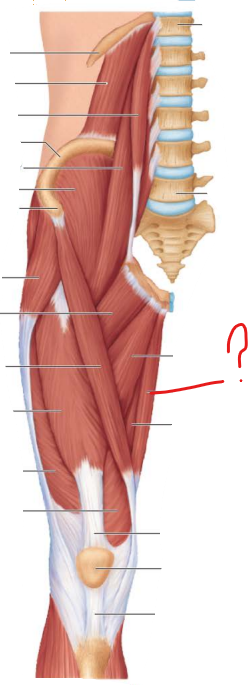
origin: inferior ramus and body of pubis
adjacent ischial ramus
insertion: medial surface of tibia just inferior to its medial condyle
action: adducts thigh, flexes and medially rotates leg
-
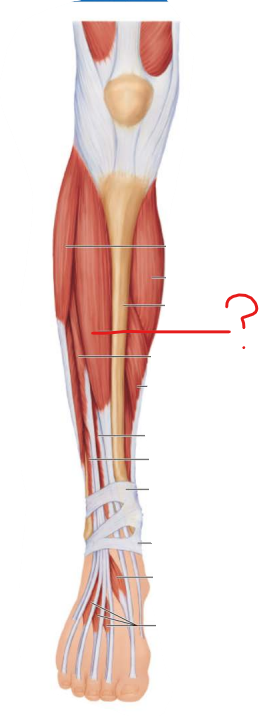
origin:
lateral condyle and upper 2/3 of tibial shaft
interosseous membrane
insertion:
by tendon into interior surface of medial cuneiform and first metatarsal bone
action: prime mover of dorsiflexion
-
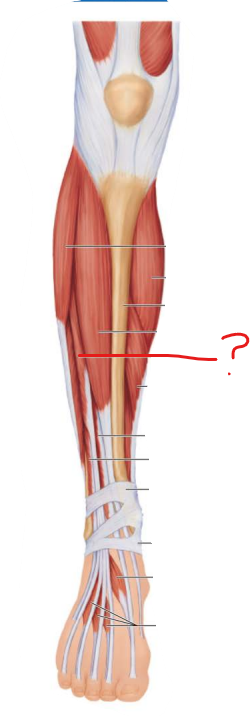
origin:
lateral condyle of tibia
proximal 3/4 of fibula
interosseus membrane
insertion: middle and distal phalanges of second to fifth toes via extensor expansion
action: prime mover of toe extension
-
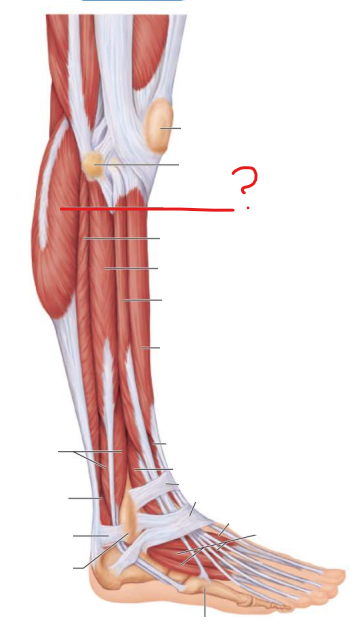
origin: by two heads from medial and lateral condyles of femur
insertion: posterior calcaneus via calcaneal tendon
action: plantar flexes foot
-
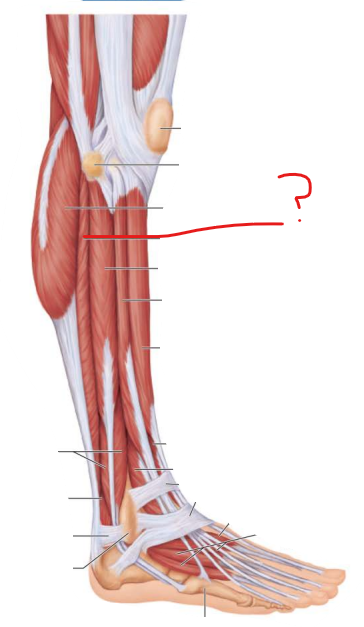
origin:
extensive origin from superior tibia
fibula
interosseus membrane
insertion:
posterior calcaneus via calcaneal tendon
action: plantar flexes foot
-
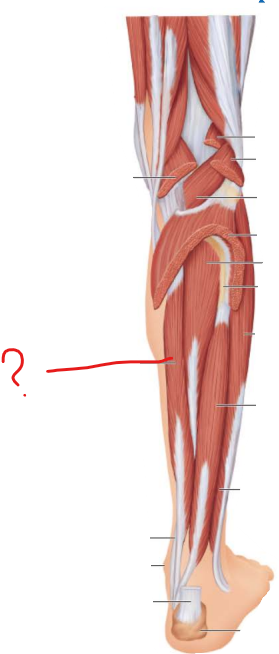
origin: extensive origin on the posterior tibia
insertion: tendon runs behind the medial malleolus and inserts into distal phalanges of second to fifth toes
action: plantar flexes and inverts foot, flexes toes
-
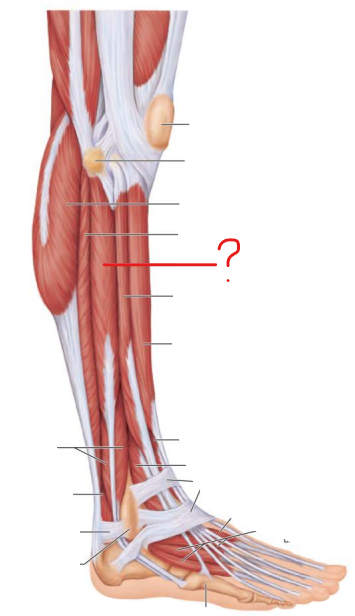
origin: head and upper portion of lateral fibula
insertion: by long tendon that curves under foot to first metatarsal and medial cuneiform
action: plantar flexes and everts foot
-
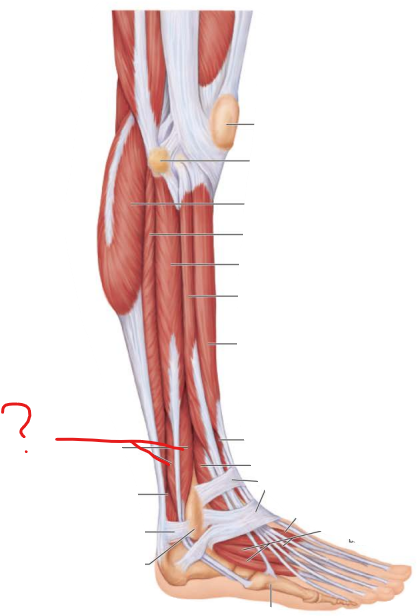
origin: distal fibula shaft
insertion: by tendon running behind lateral malleolus to insert on proximal end of fifth metatarsal
action: plantar flexes and everts foot

